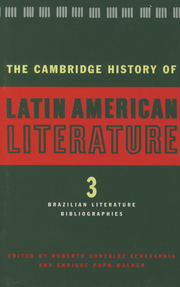Book contents
- Frontmatter
- Introduction to Volume 3
- 1 The literary historiography of Brazil
- 2 Colonial Brazilian literature
- 3 Brazilian poetry from the 1830s to the 1880s
- 4 Brazilian poetry from 1878 to 1902
- 5 The Brazilian theatre up to 1900
- 6 Brazilian fiction from 1800 to 1855
- 7 The Brazilian novel from 1850 to 1900
- 8 Brazilian fiction from 1900 to 1945
- 9 Brazilian prose from 1940 to 1980
- 10 The Brazilian short story
- 11 Brazilian poetry from 1900 to 1922
- 12 Brazilian poetry from Modernism to the 1990s
- 13 The Brazilian theatre in the twentieth century
- 14 Brazilian popular literature (the literatura de cordel)
- 15 Literary criticism in Brazil
- 16 The essay: architects of Brazilian national identity
- 17 The Brazilian and the Spanish American literary traditions: a contrastive view
- Bibliography
- Index
- References
6 - Brazilian fiction from 1800 to 1855
Published online by Cambridge University Press: 28 March 2008
- Frontmatter
- Introduction to Volume 3
- 1 The literary historiography of Brazil
- 2 Colonial Brazilian literature
- 3 Brazilian poetry from the 1830s to the 1880s
- 4 Brazilian poetry from 1878 to 1902
- 5 The Brazilian theatre up to 1900
- 6 Brazilian fiction from 1800 to 1855
- 7 The Brazilian novel from 1850 to 1900
- 8 Brazilian fiction from 1900 to 1945
- 9 Brazilian prose from 1940 to 1980
- 10 The Brazilian short story
- 11 Brazilian poetry from 1900 to 1922
- 12 Brazilian poetry from Modernism to the 1990s
- 13 The Brazilian theatre in the twentieth century
- 14 Brazilian popular literature (the literatura de cordel)
- 15 Literary criticism in Brazil
- 16 The essay: architects of Brazilian national identity
- 17 The Brazilian and the Spanish American literary traditions: a contrastive view
- Bibliography
- Index
- References
Summary
Prose fiction is without a doubt the “sleeper” of the literary genres in Brazil during the first half of the nineteenth century. In fact, it may be said that, with the exception of Teresa Margarida da Silva e Orta’s Máximas de virtude e forrnosura, ou Aventuras de Diófanes (published in the second half of the eighteenth century), Brazilian fiction was born, and experienced a rather sickly infancy, during the period 1830–1855. It remains for the second half of the nineteenth century to raise this “late bloomer” among the literary genres in Brazil to its place of glory with the works of José de Alencar and Machado de Assis. Among the reasons typically given (Salles, Primeiras manifestações da ficção na Bahia, 8) for the lethargy in the development of Brazilian fiction are the preference among writers and the public for the prestigious poetic genre, the lingering of the neoclassical influence, the popularity of ecclesiastical and oratorical rhetoric, the immediate appeal of combative prose, and a simple lack of editors disposed to experiment with publication of an unproven genre. The public attention to events surrounding Brazil’s Independence from Portugal and the pressure of immediate political and social concerns left little time for speculative writing (Paranhos, História do romantismo no Brasil, 36), though paradoxically the city of Rio de Janeiro had become a cultural center through the presence there of the Portuguese royal court, gaining a press in 1808 and publishing its first newspapers in 1813.
- Type
- Chapter
- Information
- The Cambridge History of Latin American Literature , pp. 127 - 136Publisher: Cambridge University PressPrint publication year: 1996

